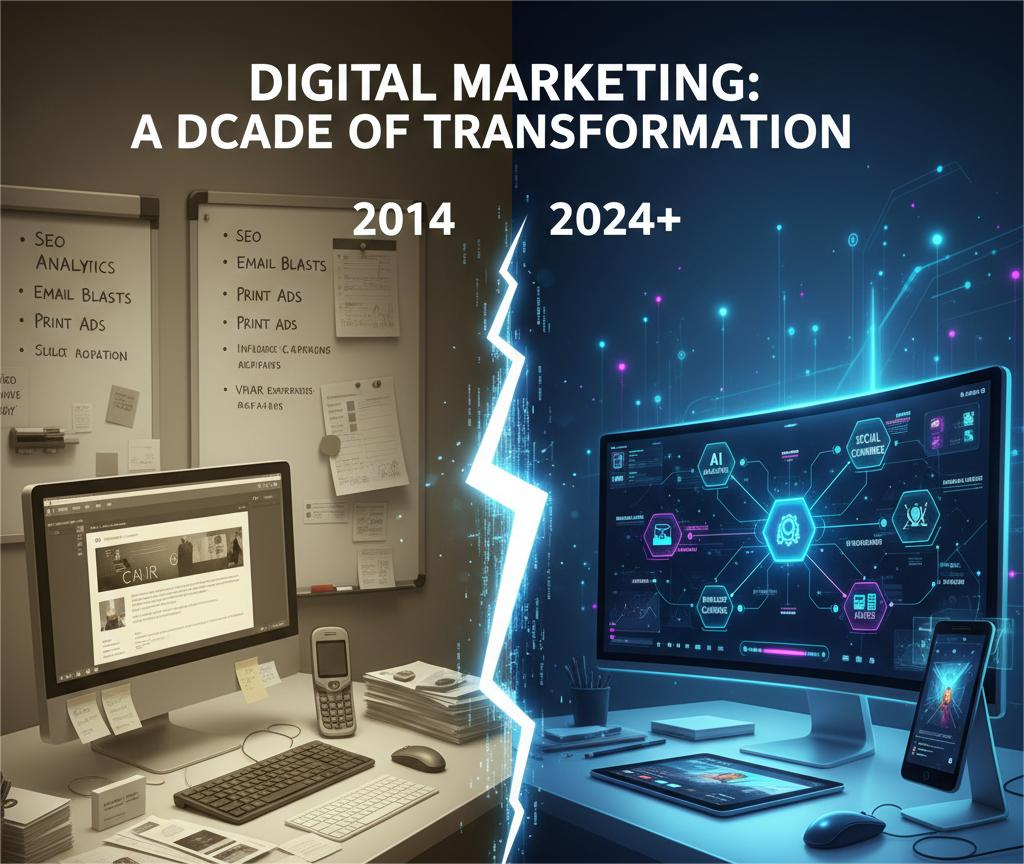Digital marketing has changed dramatically over the past decade

Digital marketing has changed dramatically over the past decade. What used to be simple, like posting content, running a few ads, and watching traffic come in, has evolved into a complex and constantly shifting landscape. With new algorithms, regular platform updates, and changing consumer behaviors, marketers are left wondering what will still work in 2025. Is SEO still relevant? Does email marketing still matter? Are social media ads worth the cost? The truth is that while digital marketing has transformed, its core principles remain the same: connection, value, and trust. What’s different is how those principles are applied in a more competitive and data-driven world.
In 2025, the digital marketing ecosystem is more crowded than ever. Every business, from small startups to global corporations, is competing for attention in the same digital space. Consumers are bombarded with content, including ads on YouTube, reels on Instagram, emails in their inbox, and notifications from every app imaginable. This overload has made attention the most valuable currency online. As a result, the best strategies are not those that shout the loudest, but those that are the clearest. Modern digital marketing is about precision, personalization, and authenticity.
Search Engine Optimization (SEO) remains a foundation of digital success, but it looks very different today than it did five years ago. The days of stuffing keywords and building hundreds of backlinks to boost your website in Google search results are gone. In 2025, SEO focuses on context, quality, and user intent. Search engines have become much more intelligent, concentrating on understanding meaning instead of just matching words. Google’s AI-powered updates reward websites that truly answer questions and provide value rather than manipulate algorithms. Marketers must think like educators and problem solvers, not just advertisers. Long-form, original content, a conversational tone, and helpful resources like case studies or expert insights are what make a page stand out. User experience also plays a critical role: fast-loading pages, mobile responsiveness, and engaging visuals directly affect rankings. SEO isn’t dead; it’s just evolved into a more human-centered discipline.
Content marketing continues to thrive, but again, the approach has changed. Consumers can spot clickbait and shallow content instantly, so brands must prioritize authenticity and depth. Quality is more important than quantity now. A single, well-crafted article that genuinely helps readers can outperform dozens of generic posts. In 2025, storytelling has become the heart of content marketing. People connect with stories, not sales pitches. Brands that share their journey, struggles, and values tend to build stronger emotional bonds with audiences. The most successful marketers understand that effective content relies on empathy—understanding what the audience feels, needs, and dreams about. Whether it’s a YouTube video, a podcast episode, or a blog article, authenticity always wins.
Social media marketing remains powerful, but its nature has changed significantly. Algorithms on platforms like Instagram, TikTok, and LinkedIn prioritize meaningful engagement over vanity metrics. Posting daily isn’t enough; the focus is on sparking genuine conversations. Short-form videos dominate the landscape, and user-generated content continues to outperform brand-produced ads. In 2025, people trust people more than logos, which is why influencer collaborations and campaigns with micro-influencers are thriving. Instead of relying solely on big celebrities, brands now work with smaller creators who have loyal, niche audiences. These micro-influencers bring authenticity and relatability, making their endorsements feel personal and genuine. Social commerce is booming—users can now discover, review, and purchase products without ever leaving the app. This has blurred the line between content and commerce, transforming every scroll into a potential sale
Email marketing, often seen as old-fashioned, remains one of the most reliable digital channels if done right. In 2025, personalization is everything. Generic newsletters rarely perform well, but targeted, behavior-based emails that offer real value still generate strong returns. Automation tools now allow marketers to send hyper-personalized messages triggered by user actions, like abandoned carts or previous purchases. Interactive emails, dynamic visuals, and AI-driven subject line optimization have made the inbox a much more engaging space. Despite the rise of social media, email marketing continues to deliver results due to its direct, personal nature—marketers don’t have to fight an algorithm to reach their subscribers.
Pay-per-click (PPC) advertising and paid social media campaigns are still effective, but they require smarter strategies. Ad fatigue is real—users often ignore ads that seem like ads. The best-performing campaigns in 2025 focus on creativity, storytelling, and audience segmentation. Instead of pushing hard sales, brands create ads that educate, entertain, or emotionally connect. Retargeting remains powerful, especially when combined with data insights from multiple platforms. Marketers who utilize first-party data and privacy-compliant tracking systems have an advantage as third-party cookies disappear. Contextual advertising, which matches ads with relevant content instead of user behavior, is making a comeback because it feels less invasive and more relevant to the user experience
One of the biggest shifts in digital marketing is the integration of artificial intelligence and automation. AI now supports nearly every aspect of marketing, from content generation and customer segmentation to predictive analytics and chatbots. Marketers can analyze consumer behavior in real time and adjust their campaigns immediately. Tools like AI-driven analytics dashboards help businesses understand what works and what doesn’t, removing much of the guesswork. Chatbots and virtual assistants enhance customer experiences by providing instant support and personalized recommendations. However, the brands that succeed balance automation with a human touch. People appreciate efficiency, but they still crave connection. A friendly, human tone in communication, whether in customer service or social media, is what makes a brand memorable.
Video marketing continues to dominate, especially short-form and live content. Platforms like YouTube Shorts, Instagram Reels, and TikTok have changed how consumers digest information. Attention spans are short, and videos capture attention faster than text or images. Educational, entertaining, and emotionally driven videos perform best. Live streaming creates real-time interaction, making audiences feel part of something spontaneous and authentic. Brands that use video storytelling effectively not only promote their products but also build experiences around them. The rise of augmented reality (AR) and virtual reality (VR) has opened new creative avenues, allowing customers to visualize products or explore virtual showrooms before making decisions.
Another timeless principle that drives success in 2025 is the power of trust. In an age of misinformation and digital noise, credibility has become a priceless asset. Consumers research before buying, check reviews, and look for transparency. Brands that communicate openly, share their values, address mistakes honestly, and show social responsibility build stronger loyalty. Reputation management has become a central pillar of digital marketing. A single negative review can influence thousands, but so can a heartfelt response. In this hyper-connected world, authenticity and honesty are mandatory for survival.
Community building is another key part of modern marketing that many overlook. Audiences no longer just want to buy from brands; they want to belong. Creating spaces where customers can connect, share experiences, and interact directly with the brand adds long-term value. Online communities, private groups, Discord servers, and brand ambassador programs help turn one-time buyers into lifelong advocates. This sense of belonging fuels organic growth because satisfied customers naturally become your most powerful marketers through word-of-mouth and referrals.
Data-driven decision-making separates average marketers from great ones in 2025. With various tools to track customer journeys, behaviors, and preferences, guessing is no longer acceptable. Marketers who rely on real insights can optimize campaigns instantly, improving performance while saving budget. But with data comes responsibility. Privacy regulations are tightening worldwide, so transparency about data usage is crucial. Respecting user privacy isn’t just a legal obligation; it’s a trust signal. Brands that prioritize data security and ethical practices earn customer confidence and long-term loyalty.
Even with all these changes, one thing remains consistent: the human factor. No matter how advanced digital marketing becomes, people still buy from people. They respond to emotion, storytelling, and authenticity. The technology, tools, and platforms may evolve, but the core mission of marketing stays the same: to connect with real human beings and add value to their lives. The most effective marketers in 2025 are not those who rely on trends alone but those who combine creativity, empathy, and strategy.
In summary, digital marketing is far from dead; it’s more alive than ever, just more sophisticated. SEO continues to work when it focuses on value and the user. Content marketing thrives when it’s authentic and story-based. Social media delivers results when it sparks conversation instead of noise. Email remains powerful when it’s personalized and purposeful. Paid ads still convert when built around creativity and relevance. AI and automation make marketing smarter, but human empathy keeps it meaningful. The future of digital marketing belongs to those who understand this balance—those who use technology to enhance connection, not replace it.
In 2025 and beyond, success in digital marketing comes from mastering both art and science: data guides the direction, but storytelling wins the heart. What still works isn’t the latest hack or trick; it’s the timeless ability to create genuine relationships with your audience. The channels may evolve, and algorithms may change, but the essence of great marketing will always remain the same: real people connecting with real value.
